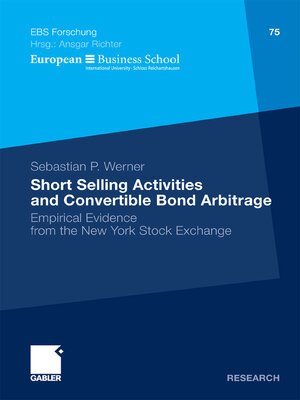Short Selling Activities and Convertible Bond Arbitrage
ebook ∣ Empirical Evidence from the New York Stock Exchange · ebs-Forschung, Schriftenreihe der EUROPEAN BUSINESS SCHOOL Schloß Reichartshausen
By Sebastian P. Werner

Sign up to save your library
With an OverDrive account, you can save your favorite libraries for at-a-glance information about availability. Find out more about OverDrive accounts.
Find this title in Libby, the library reading app by OverDrive.



Search for a digital library with this title
Title found at these libraries:
| Library Name | Distance |
|---|---|
| Loading... |
The main cause of financial crisis may be found in the over-optimistic investing of b- ers that leads market prices away from fundamental values. However, in the aftermath of "excess" when stock markets tumble, it is usually the pessimists or short sellers who get publicly blamed. Despite the longstanding controversy on short selling activities, this market instrument remains a widely misunderstood concept by the public while it is an essential tool used by hedge funds for speculation and arbitrage. That is why it is important to investigate short selling for its different motivations and the resulting effect on stock returns, a subject whose empirical study is in its infancy. In his doctoral thesis, Sebastian examines convertible bond arbitrage, which is a typical hedge fund strategy that involves a long position in a convertible bond and a significant short position in the underlying stock. The short selling is employed as a hedge against movements in the stock price. With every change in the stock price, the hedge needs to be continuously readjusted, a practice which should lead companies with convertible bonds outstanding to have on average higher short selling activity than companies without convertible bonds. Furthermore, fundamental information should be processed differently in stocks with convertible bonds as stock price reactions based on the information are accompanied by the short selling of the convertible bond arbit- geurs.







